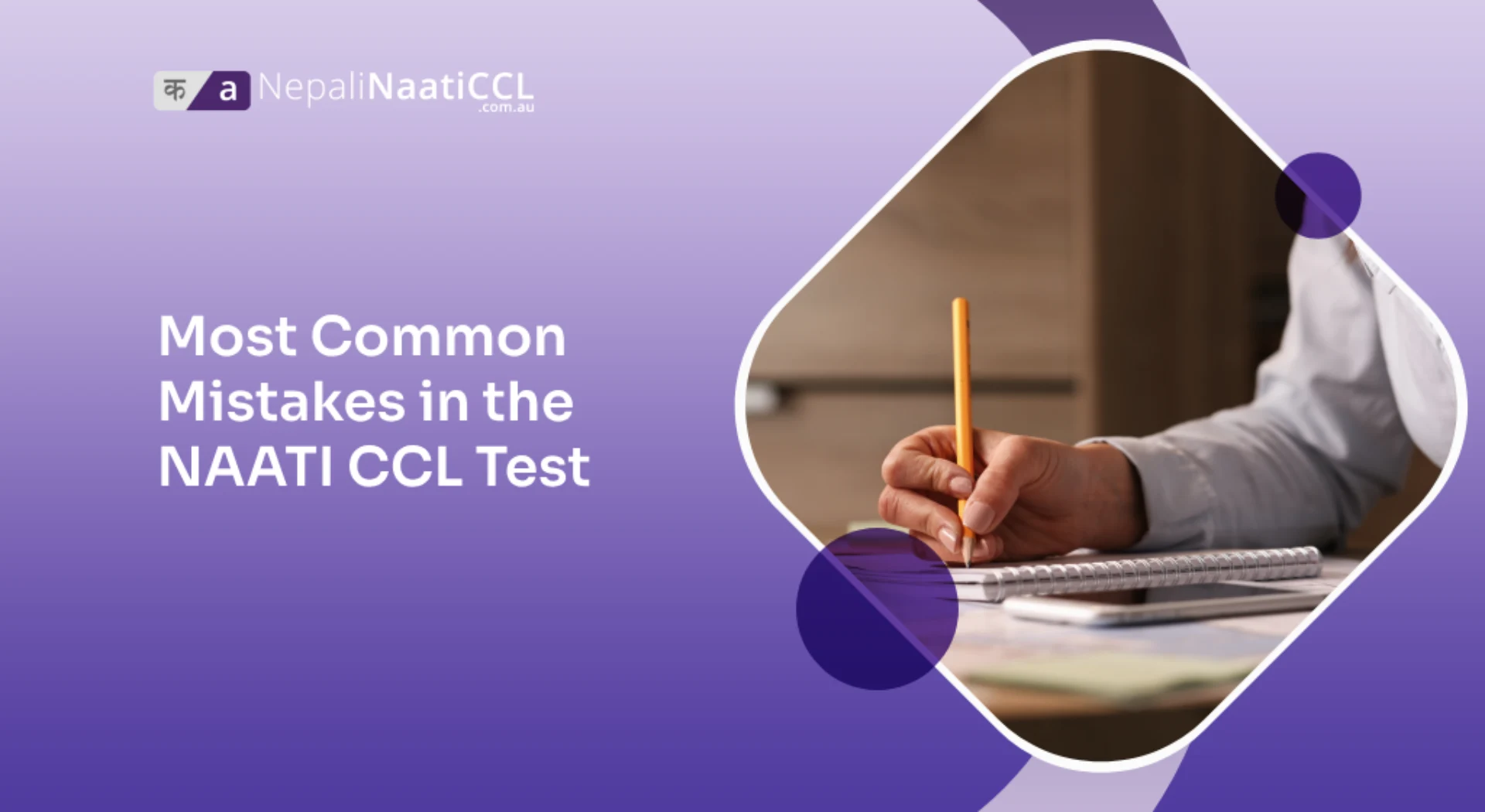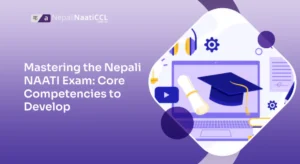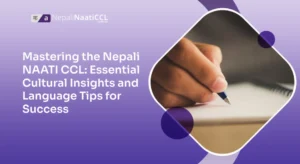Welcome to our detailed blog post on the most common mistakes in the NAATI CCL test. This test is crucial for you if you want a career to become a skilled translator or get five valuable Australian PR points.
Anyone makes mistakes. However, if you pass the NAATI CCL exam on your first attempt, you will need a heads up on the most common mistakes people make preparing for the NAATI CCL test.
Hence, in this blog, I will provide an in-depth analysis of the mistakes and the challenges they pose. I will also walk you through practical examples and scenarios that sometimes trip up even the most capable candidates.
So, let’s work hand-in-hand to achieve your professional goals and open up new migration opportunities for your better future.
Let’s get started!
NAATI CCL Test: Brief Guide to NAATI CCL Success
I created this guide to provide a short roadmap and support system for you to follow throughout your preparation journey for the NAATI CCL Test. By offering a structured approach, the guide will help you with the necessary knowledge and skills to perform at your best during the examination.
Understanding the exam format and question types is very important if you aim to clear the NAATI CCL exam with the score you desire and identify common mistakes. You can understand the test and NAATI CCL marking criteria by gaining insights into these areas.
In addition, you can focus on practical strategies and insider tips from premium sources like CCLHUB and NepaliNAATICCL. Doing so will help you with time management, note-taking, and handling different types of vocabulary in a conversation.
Always remember that you have the power to take charge of your preparation and confidently approach the exam. Hence, incorporating these easy strategies into your preparation can build confidence in your abilities and improve your overall performance.
Let’s dive deep into more tips and strategies for the NAATI CCL test and how difficult it is to prepare for it.
8 Most Common Mistakes in the NAATI CCL Test

Clearing the NAATI CCL test is a challenging task. Furthermore, with the prospect and opportunities it unlocks, it has been more competitive in the recent market.
Moreover, to help you compete and pass the NAATI CCL examination, the following are the eight most common mistakes in the NAATI CCL test. You must also avoid these mistakes in preparing for the CCL test.
1. Misinterpreting Context and Cultural Variations
In the NAATI CCL test, context plays a crucial role in accurately interpreting conversations. Candidates often need help understanding the context of a dialogue, leading to misinterpretations.
To overcome this, it’s essential to carefully analyze the given scenario, considering the participants’ roles, settings, and the purpose of the conversation. Also, paying close attention to context can provide more relevant and accurate interpretations.
Likewise, cultural biases and assumptions can unconsciously influence interpretation, leading to misunderstandings. Candidates must know their cultural background and remain open-minded to diverse perspectives.
However, by actively seeking to understand and appreciate cultural differences, interpreters can avoid projecting their biases onto the dialogue. Embracing cultural sensitivity will enhance the quality and accuracy of your interpretations.
2. Inadequate Time Management
Time management is important for any kind of test or exam. Not to mention, candidates have very strict guidelines regarding time management in the NAATI CCL test.
In the CCL exam, candidates have limited time to interpret multiple conversations. A common mistake is getting stuck on a single question, leaving insufficient time for others.
To tackle this, practice allocating specific time frames to each dialogue during preparation. This will help you efficiently manage your time during the actual test and attempt all questions.
Also, candidates should practice maintaining a balance between delivering precise interpretations and keeping up with the pace of the conversation. Remember, practice makes perfect, and honing this skill will boost your performance on exam day.
3. Lack of Active Listening Skills
Active listening is the foundation of interpreting dialogues successfully. Many candidates need help to grasp the complete message due to distractions or lack of focus.
However, to enhance active listening skills, exercise regularly, such as interpreting speeches or audio recordings. Concentrate on understanding the speakers’ core message, underlying emotions, and intentions.
Moreover, distractions can undermine even the most skilled interpreters. External noises or internal thoughts may divert your attention. To avoid that, prioritize creating a conducive environment during practice or exam day.
4. Misjudging Register and Tone
The NAATI CCL test often presents conversations with varying registers and tones, from formal to informal. Misjudging the appropriate register and tone can lead to misinterpretations and affect the overall quality of your responses.
Hence, practice recognizing different linguistic registers and tones, and adapt your interpretation style to reflect the context accurately. Also, politeness and formality are essential aspects of communication. You must always be mindful of the appropriate level of formality required in their interpretations.
5. Neglecting Key Terminologies
Identifying essential terminologies relevant to the NAATI CCL test is vital in clearing the NAATI CCL exam. Terminologies specific to various domains frequently appear in the NAATI CCL test conversations and are crucial to ensure accuracy.
Also, regularly review and practice these terms for seamless interpretations. Building a solid foundation in specialized vocabulary is essential for accurate interpretations.
Moreover, candidates should familiarize themselves with terminologies related to healthcare, legal matters, finance, etc., as these often appear in the test. Regularly practice these terms to develop confidence in interpreting dialogues from different domains.
6. Overlooking Notetaking Techniques
Notetaking is a valuable skill to help you retain essential information during the test. Some candidates overlook this aspect, leading to memory lapses during interpretations.
Hence, practice summarizing key points during listening exercises and refine your notetaking techniques. Also, well-organized notes will be your lifeline during the exam, helping you interpret accurately.
In the NAATI CCL test, you’ll have a short preparation time before interpreting each dialogue. Organize your notes systematically to reference them during the interpretation quickly. Furthermore, use symbols, abbreviations, and highlight keywords to streamline the information and avoid fumbling during the exam.
7. Inconsistent Language Proficiency
Language proficiency is fundamental for success in the NAATI CCL test. Many candidates need help when their language skills are imbalanced.
Also, Identify weaker areas in your language proficiency and dedicate focused practice to improve them. This will lead to a more confident and proficient performance in both your source and target languages.
Likewise, maintaining fluency in both your source and target languages is essential to excel in the test. Engage in regular language practice through reading, writing, listening, and speaking exercises.
8. Ignoring Mock Tests and Practice Sessions
Mock tests and practice sessions are invaluable tools for NAATI CCL test preparation. Ignoring these opportunities can leave you unprepared for the actual exam format.
Hence, regularly engage in simulated test scenarios to familiarize yourself with the test structure, time constraints, and overall demands. Also, constructive feedback is a powerful tool for improvement. After each mock test or practice session, analyze your performance and seek feedback from mentors or peers.
Use this feedback to identify areas for improvement and refine your strategies. The confidence gained through practice, and feedback will reflect your test performance positively.
NAATI CCL Assessment Criteria
The NAATI CCL assessment criteria form the foundation of evaluating candidates’ language proficiency and interpretation skills during the Community Credentials for Languages (CCL) Test.
Understanding these assessment criteria is crucial for candidates to tailor their preparation and performance to align with the examiners’ expectations.
First and foremost is language proficiency, which involves candidates’ ability to comprehend and express ideas accurately and fluently in both the source and target languages. The examiners assess grammatical accuracy, vocabulary range, and overall linguistic competence during the interpretation tasks.
Also, candidates are expected to demonstrate their command of technical terminologies and domain-specific vocabulary relevant to the dialogues presented in the test.
Additionally, cultural sensitivity is a significant component of the assessment criteria. The examiners test candidates’ ability to understand and respect cultural differences, avoiding personal biases or assumptions that might interfere with accurate interpretation.
Interpreters must display cultural awareness, ensuring their interpretations are culturally appropriate and sensitive to the participants’ backgrounds and cultural norms. Likewise, aspiring NAATI CCL candidates should focus on honing their linguistic skills, grasping the context of dialogues, and embracing cultural awareness during their preparation.
By understanding g these criteria, candidates can confidently approach the NAATI CCL test, knowing that they are well-prepared to meet the rigorous evaluation standards set by NAATI examiners.
Conclusion
In conclusion, recognizing and addressing the most common mistakes in the NAATI CCL exam is vital for candidates seeking NAATI CCL certification or five Australian PR points. The exam’s unique format and stringent evaluation criteria demand a high level of preparation and proficiency in interpretation skills.
However, through continuous practice, preparation, and a positive mindset, candidates can build the confidence to navigate the complexities of the NAATI CCL exam successfully. Furthermore, seeking feedback from mentors or peers and incorporating it into your preparation can refine your performance.
Also, as you navigate your journey to success, remember that growth comes from avoiding mistakes, embracing challenges, and using them as stepping stones toward excellence.
As you prepare for the NAATI CCL exam, it’s essential to have access to comprehensive and reliable study materials. Fortunately, CCLHUB is a valuable portal offering resources to aid your preparation. CCLHUB is a trusted platform that provides aspiring candidates with various NAATI CCL preparation materials, including NAATI CCL mock tests and free NAATI CCL test samples.
With CCLHUB’s support, you can maximize your potential and become a proficient and accredited language professional in Australia or earn five valuable PR points.
Happy Learning!!
FAQ
Q.1: What are the common mistakes in the NAATI CCL Test?
Some common mistakes include misinterpreting context and cultural nuances, inadequate time management, lack of active listening skills, misjudging register and tone, neglecting key terminologies, overlooking notetaking techniques, inconsistency in language proficiency, and ignoring mock tests and practice sessions.
Q.2: How can I improve my performance in the NAATI CCL Test?
Improve performance by focusing on language proficiency, cultural sensitivity, and active listening skills. Moreover, practice regularly with mock tests, develop efficient notetaking techniques, and build a strong vocabulary in domain-specific topics. Seek feedback and use it to refine your approach.
Q.3: Where can I find NAATI CCL preparation materials?
You can find comprehensive preparation materials, including mock tests and free test samples, on CCLHUB. It is a reliable platform that offers resources curated by experts to support your exam preparation journey.
Q.4: How can CCLHUB mock tests help me prepare for the NAATI CCL Test?
CCLHUB mock tests simulate the actual exam environment, providing you with invaluable practice. By taking these tests, you can familiarize yourself with the exam format and time constraints and develop confidence in your interpretation skills. Also, the tests help identify areas for improvement, enabling you to fine-tune your performance for success.




